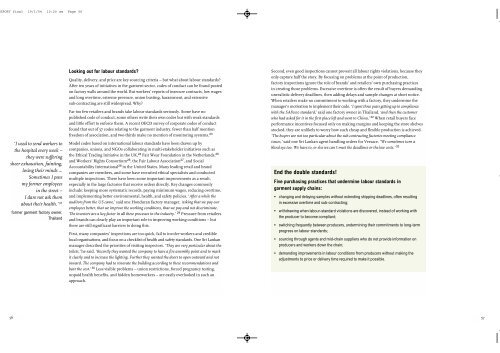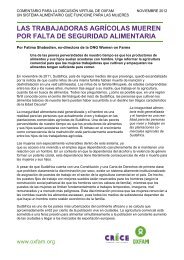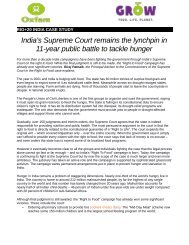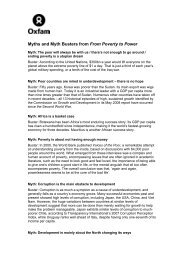EPORT final 19/1/04 10:20 am Page 54Moving onThe garment industry is in a state of constant flux, with mid-chain suppliers andsourcing companies ready to switch factories or countries for a small price cut. Suchshort-termism is greatly exacerbated by the impending phase-out of the Multi-FibreArrangement. ‘In the textile sector, you live on a day by day basis, so we don’t think too muchbeyond 2005,’ said one garment factory director in Cambodia. 12 In Indonesia, South Koreangarment factory owners are likewise at the ready to move on. According to the Directorof the Korean Trade Centre in Jakarta, ‘The investors keep saying to me that the circumstanceshave gotten worse as they see labour movements rising … They are eyeing China and Viet Namas new locations.’ 13 But even within China, investors focus on short-term returns. ‘I am atypical Hong Kong entrepreneur,’ said one factory director, currently in Shenzhen.‘Hong Kong businessmen won’t invest huge money to wait for luck in the future. We’ve got nopoint to wait for returns beyond five years’ time. Things change rapidly, especially in China,you know.’ 14Squeezing producers’ marginsGrowing global competition among producers is driving prices down. So too is thecompetition among retailers, who entice consumers with ‘perpetual sales’. In the USA,for example, garment retail prices have lagged behind inflation since 1992 and havebeen falling since 1999. 15 The strategy is led by the high volume, low price retailerslike Wal-Mart and Target, and their growing market share. By 2002, one in five USconsumers bought most of their clothes from ‘mass merchants’ like these, and one inevery eight garments came from Wal-Mart. 16 Retailers protect their profits by demandinglower prices from suppliers and adding on charges. ‘Marketing contributions’, for example,can be levied on suppliers to pay for shop display space or for a place in a catalogue;when profits drop, some retailers send buyers out to get ‘profit contributions’ fromsuppliers to boost them back up.The combined effect is passed down to producers as falling prices, while productioncosts are rising for many. According to a manager of a Sri Lankan factory with goodlabour standards, ‘<strong>Our</strong> wage and electricity costs have increased around twenty per centover the past five years, yet the prices we receive have gone down by 35 per cent in the pasteighteen months alone. I feel that prices are reaching rock bottom in Sri Lanka and I am notsure how we will survive.’ 17 In Honduras two factories producing T-shirts for exportreported that the price paid per dozen had fallen from US$3.70 in 2000 to US$2.85in 2003 – a 23 per cent drop in three years. 18 In China, too, average garment exportprices fell 30 per cent between 1997 and 2002, while production costs rose 10 per centfrom 1999 to 2002 – in part due to smaller and more varied orders. 19Wal-Mart worldwide: who pays for price cuts?‘Always low prices’ promises the world’sbiggest retailer. With sales of US$245bn in2002, Wal-Mart is number one in the USA,Canada, and Mexico, and making inroadsinto China, Brazil, and South Korea.Investors like the company: the share pricehas quadrupled since 1994. 20 Consumerslike it too: in 2002 four out of five UShouseholds shopped there, and the companycut its prices for US customers by US$20bn.But producers and their employeesworldwide bear the cost of those price cuts.One US-owned factory in Kenya makingjeans for Wal-Mart knows the pressure.Wal-Mart buys direct from the factory, butpushes down the price it pays by gettingquotations from several global sourcingagents and challenging the factory to matchthe lowest price. In addition, Wal-Mart’sbuyers demand to know the price of everycomponent and step involved in production,eliminating any profit margins on inputs.Factory workers are left to face the squeeze.Excessive hourly production targets arealmost impossible to reach. Few darecomplain. Wal-Mart’s own code of conductis silent on trade union rights, but thisfactory has its own code. Rule Number Four:‘Every employee is entitled to freedom ofassociation. You are free to join a tradeunion if you wish.’ In April 2003, when theywent on strike to demand decent pay, mostunion members were fired. Julia, a clericalworker, was rehired. ‘Me, they gave me myjob back. I was very lucky,’ she said,‘When I got there the management told me“Next time, Julia, don’t do that again.You did bad to join a union” ... Everybodywants the trade union, but they can’t say it …So we just keep quiet.’ 21Facing low profits and strict shippingdeadlines, the factory manager sub-contractsorders out to another factory in Nairobiand pays that sub-contractor even less.No wonder that workers there face worseconditions. ‘There are people working day,night, day, night without sleeping,’ said33 year old Miriam, a sewing operatorthere, ‘because they are told “You are notmeeting the target, and the shipment is verynear. And if the ship goes, we will transportthese garments by air and it is very costly.”’Overtime is long and underpaid, sexualharassment is rife, and fear of being firedstifles complaint.The Kenya Human <strong>Rights</strong> Commission,together with Workers’ <strong>Rights</strong> Watch,a network of unions and NGOs, iscampaigning for workers like these to bepaid maternity leave, to receive a livingwage, and to have the freedom to join tradeunions. But targeting factory owners andmanagers alone cannot solve the problem.‘I hear that civil society considers thesourcing companies like Wal-Mart to beallies,’ said the director of one leading EPZfactory. ‘You think that they can put pressureon us to improve the working conditionshere. We should be putting pressure onthem – for all they care, they want theproducts on time and at the correctprice.’ 225455
EPORT final 19/1/04 10:20 am Page 56‘I used to send workers tothe hospital every week –they were sufferingsheer exhaustion, fainting,losing their minds ...Sometimes I passmy former employeesin the street –I dare not ask themabout their health.’ 31former garment factory owner,ThailandLooking out for labour standards?Quality, delivery, and price are key sourcing criteria – but what about labour standards?After ten years of initiatives in the garment sector, codes of conduct can be found postedon factory walls around the world. But workers’ reports of insecure contracts, low wagesand long overtime, extreme pressure, union busting, harassment, and extensivesub-contracting are still widespread. Why?Far too few retailers and brands take labour standards seriously. Some have nopublished code of conduct, some others write their own codes but with weak standardsand little effort to enforce them. A recent OECD survey of corporate codes of conductfound that out of 37 codes relating to the garment industry, fewer than half mentionfreedom of association, and two-thirds make no mention of monitoring systems. 23Model codes based on international labour standards have been drawn up bycompanies, unions, and NGOs collaborating in multi-stakeholder initiatives such asthe Ethical <strong>Trading</strong> Initiative in the UK, 24 Fair Wear Foundation in the Netherlands, 25and Workers’ <strong>Rights</strong> Consortium 26 , the Fair Labour Association 27 , and SocialAccountability <strong>International</strong> 28 in the United States. Many leading retail and brandcompanies are members, and some have recruited ethical specialists and conductedmultiple inspections. There have been some important improvements as a result,especially in the large factories that receive orders directly. Key changes commonlyinclude: keeping more systematic records, paying minimum wages, reducing overtime,and implementing better environmental, health, and safety policies. ‘After a while theauditors from the US came,’ said one Honduran factory manager, ‘asking that we pay ouremployees better, that we improve the working conditions, that we pay and not discriminate.The investors are a key factor in all these processes in the industry.’ 29 Pressure from retailersand brands can clearly play an important role in improving working conditions – butthere are still significant barriers to doing this.First, many companies’ inspections are too quick, fail to involve workers and crediblelocal organisations, and focus on a checklist of health and safety standards. One Sri Lankanmanager described the priorities of visiting inspectors. ‘They are very particular about thetoilets,’ he said. ‘Recently they wanted the company to have a fire assembly point and to markit clearly and to increase the lighting. Further they wanted the doors to open outward and notinward. The company had to renovate the building according to these recommendations andbear the cost.’ 30 Less visible problems – union restrictions, forced pregnancy testing,unpaid health benefits, and hidden homeworkers – are easily overlooked in such anapproach.Second, even good inspections cannot prevent all labour rights violations, because theyonly capture half the story. By focusing on problems at the point of production,factory inspections ignore the role of brands’ and retailers’ own purchasing practicesin creating those problems. Excessive overtime is often the result of buyers demandingunrealistic delivery deadlines, then adding delays and sample changes at short notice.When retailers make no commitment to working with a factory, they undermine themanager’s motivation to implement their code. ‘I spent three years getting up to compliancewith the SA8000 standard,’ said one factory owner in Thailand, ‘and then the customerwho had asked for it in the first place left and went to China.’ 32 When retail buyers faceperformance incentives focused only on making margins and keeping the store shelvesstocked, they are unlikely to worry how such cheap and flexible production is achieved.‘The buyers are not too particular about the sub-contracting factories meeting complianceissues,’ said one Sri Lankan agent handling orders for Versace. ‘We sometimes turn ablind eye too. We have to, or else we can’t meet the deadlines or the low costs.’ 33End the double standards!Five purchasing practices that undermine labour standards ingarment supply chains:• changing and delaying samples without extending shipping deadlines, often resultingin excessive overtime and sub-contracting;• withdrawing when labour-standard violations are discovered, instead of working withthe producer to become compliant;• switching frequently between producers, undermining their commitments to long-termprogress on labour standards;• sourcing through agents and mid-chain suppliers who do not provide information onproducers and workers down the chain;• demanding improvements in labour conditions from producers without making theadjustments to price or delivery time required to make it possible.5657
















